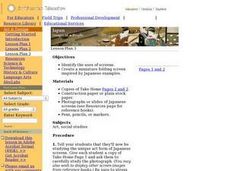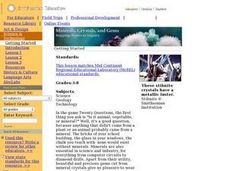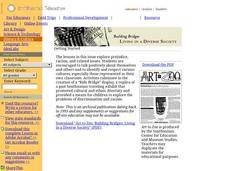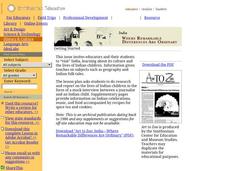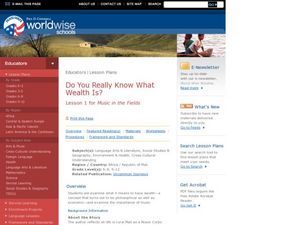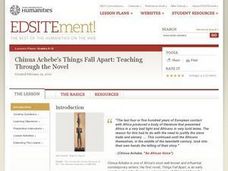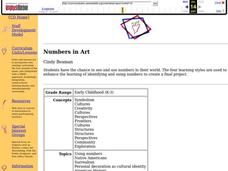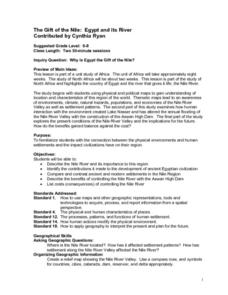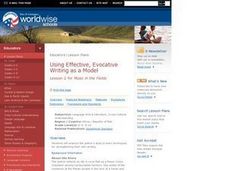Curated OER
Teaching With the Power of Objects
Young scholars define value of an object. In this value lesson plan, students identify reasons for collecting objects, compile a personal inventory of items they find valuable, and then define why those items are valuable to them. In...
Curated OER
Playing Historical Detective: Great Grandmother's Dress and Other Clues to the Life and Times of Annie Steel
Students draw conclusions about an mystery person based on documents and artifacts provided. In this drawing conclusions lesson, students become detectives by reading and analyzing evidence provided. This lesson includes information on...
Curated OER
Japan: Images of a People
Students learn the geography of Japan and its location in reference to the United States.
Curated OER
Plants and Animals: Partners in Pollination
Students identify the plant parts and bee structures that are involved in pollination. They simulate pollination in a group activity and process the information.
Curated OER
Minerals, Crystals, and Gems
Learners discover the relationships between minerals, crystals and gems. They bring in rocks that they find at home, in the schoolyard, etc. and examine them and attempt to identify them. They set up a classroom exhibit that includes all...
Curated OER
JAPAN, IMAGES A PEOPLE
Students interpret Japanese and American paintings; evaluate paintings as sources of cultural and historical information
Curated OER
Lift and Drag: Principles of Flight and the Soaring Imagination
Students construct models of early gas balloons and gliders. In this balloon and glider lesson, students create models of early gas balloons and gliders, discover how the forces of lift and drag effect aircraft in flight, and put on...
Curated OER
Building Bridges: Living in a Diverse Society
Students participate in various activities that help them build esteem, and explore racism. In this multicultural lesson plan, Students increase their awareness of, and appreciation for, cultural differences and similarities. This...
Curated OER
India: Where Remarkable Differences Are Ordinary
Pupils research India and Indian culture. In this Indian research lesson plan, students research and report on the lives of Indian children. The report will be in the form of a mock interview between a journalist and an Indian child....
Curated OER
Mesoamerica
Students demonstrate knowledge of early Middle American civilizations. They study Mesoamerican i religions, governments, and achievements. They identify geographies of North and South America.
Curated OER
Gandhi's Salt March, A Simulation
Young scholars examine Gandhi's Salt March. In this peace and tolerance lesson, students discuss the Salt Tax Levy that was imposed in India. Young scholars then debate how the Indian National Congress should have handled the issue.
Curated OER
Demystifying Stereotypes and Understanding
Students investigate cultural diversity. In this Asian cultures lesson, students discuss the attributes of cultures and participate in a classroom simulation that requires them to experience Asian cultural norms and compare them to...
Curated OER
Do You Really Know What Wealth Is?
Students explore what it means to have wealth in Mali and in the United States. In this economics lesson, students read "Music in the Fields." Student groups answer discussion questions. Students reflect on the purpose music serves...
Curated OER
Chinua Achebe's Things Fall Apart: Teaching Through the Novel
Students are introduced to Chinua Achebe's first novel and to his views on the role of the writer in his or her society. It can be used alone or in conjunction with the related instructional activity Chinua Achebe's Things Fall Apart.
Curated OER
Numbers In Art
Help develop an awareness of the natural and manufactured environment and relate the subject matter to young learners' lives. The interpretation of the meaning of art is reinforced and its application to self and other audiences is...
Curated OER
The Gift of the Nile: Egypt and its River
Young scholars begin with a piece of a puzzle that shows an artifact from ancient Egypt. They find others who have pieces that go with their puzzle piece. Students work in these groups to construct a relief map of the Nile River Valley.
Curated OER
Using Effective, Evocative Writing as a Model
Students analyze the author's style to learn techniques for strengthening their own writing. They re-read "Music in the Fields" and highlight images that create vivid pictures in their minds-places where Young "shows, not tells" and...
Curated OER
Slave Auctions in South Carolina
Students examine primary sources in the form of auction records, create frequency charts, graphs and diagrams that they analyze to anwer questions followed by the writing of a paper that demonstrates their comprehension of the lesson.
Curated OER
The U.S. Trade Embargo on Cuba
Students examine perspectives for and against the U.S. trade embargo on Cuba, develop a position on the embargo and articulate viewpoints in a public forum.
Curated OER
Pangaea Puzzle Pieces
Students i examine 10 pieces of evidence for the Pangaea theory and use them to reconstruct the super continent. They determine that land masses on Earth are slowly changing shape as a result of moving for millions of years.
Curated OER
Neanderthals
Students study Neanderthals. For this Prehistoric life lesson, students investigate two main theories regarding the relationship between Neanderthals and modern man. Students will conduct research through several provided web sites and...
Curated OER
WHO Wants Clean Water! Do You? Solving Conflicts Over International Water Rights Issues
Students examine the water rights on an international scale. In this social studies lesson, students research on a specific water rights issue. They write a paper about their findings and create a PowerPoint presentation which they share...
Curated OER
Battering Through the Seasons
Students define bartering and barter to investigate supply and demand. In this bartering activity, students read A New Coat for Anna and recall how they exchanged merchandise in the story. Students complete a sequential graphic...




